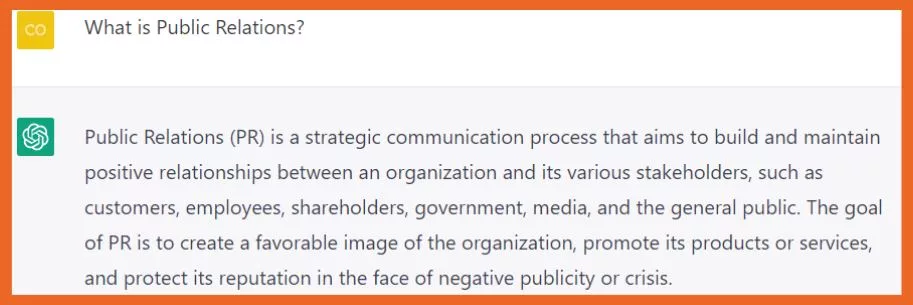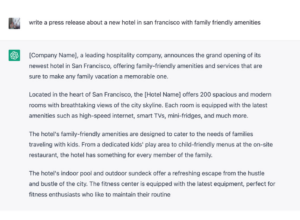Why Marketers Should Get to Know ChatGPT and Why We Still Need Storytellers

Chat GPT generated definition of public relations.
By: Arianna Georgi, SEO Consultant, J. Walcher Communications
Every few years, our newsfeed is flooded with buzz about new AI technology that people are both excited and nervous about. There’s a scramble to test it out and see what the strengths and limitations are. From Watson on Jeopardy (2011) to Alexa (2014), we have a fascination with AI.
When ChatGPT launched, it was the sophistication that took everyone by surprise. The quality of the content the tool provides, coupled with its ability to learn based on the previous questions it has been asked, makes it far more compelling than what we’ve seen before.
Already companies are off and running with the various ways to use it for everything from writing code and customer service chatbots to generating content. Competitors are trying to create their versions, and others are trying to use the technology behind it to solve problems and save time. Instead of trying it and dismissing it, marketers should be asking themselves how they can use it now and in the future.
I’ve been using ChatGPT for a variety of SEO reasons, from keyword research to help generate page elements (meta descriptions, tags). I’ve also been using it to generate ideas for new blog topics., or just get me out of a rut and brainstorm when it comes to creating e-blast copy. I am consistently impressed with the output, and how it responds to new directions. I know people who are using it to save themselves hours of work writing code, customer response letters or repetitive product descriptions for projects like new e-commerce stores.
But there is one constant – a human still needs to be involved. For more basic tasks, that means someone is needed to look over the output to make sure the responses make sense, and then to shift what is being inputted and asked. For a task like keyword research, the tool needs to be guided by creativity and the human’s additional research into market demographics and trends.
And when it comes to content creation, the human factor becomes even more important. It makes sense that with a tool this good we’ll want to rely on AI-generated content to save ourselves time. There are things that it can easily handle: customer service responses, form letters, AdWords text, meta descriptions, etc. But we can’t rely on it to create the same “real” content a human could.
I might use the tool to brainstorm social media captions if I were stuck in a rut. Here I asked it to help write posts, as an Influencer to sell some blankets for a brand collaboration:

The output isn’t bad, and maybe might spark an idea for me, but it’s obvious posts like these are never going to be better than content from a true and creative “content creator.” These posts could sell a few blankets if I used them, but there’s no story to engage people with the brand. At the end of the day, it’s good, but it’s still the “bot content” social platforms are already trying to crack down on.
Or to use a public relations example, I asked ChatGPT to create a “press release” about a new hotel in San Francisco.
Then as a follow-up, I could tell it the hotel is “family-friendly” and asked it to modify its response:

Once again, it’s passable, and hits the checkboxes, but this content isn’t going to replace a well-thought-out release that tells a story about a brand, and it’s certainly not going to draw any real media attention.
In other words, those who create meaningful content still have a job to do. And as generic content becomes increasingly more AI-generated, this job will become increasingly more important. ChatGPT is free for anyone, a user could sit and write hundreds of blogs or press releases in a day. It’s a safe bet there’s about to be an avalanche of content, and those who wish to stand out from the crowd will need to be original, daring, and bring something new to the table.
That’s the thing, ChatGPT is never going to tell an original story. Everything it creates is sourced from something that already exists or a prompt it was given. Marketers that can come up with fresh ideas are always going to have an advantage.
ChatGPT Shouldn’t Scare You…
…But if it does, that’s probably a good thing. A tool this sophisticated, which is going to continue to evolve, SHOULD be a wake-up call to any marketer who has gotten complacent when it comes to pitches and strategies. If your agency has been using “plug and play” methods when it comes to client content, then yes, ChatGPT may be about eliminating the middleman. But for agencies, marketers and creators who love to get creative, it’s just another tool to add to the arsenal, and another way to stand out from the crowd.




